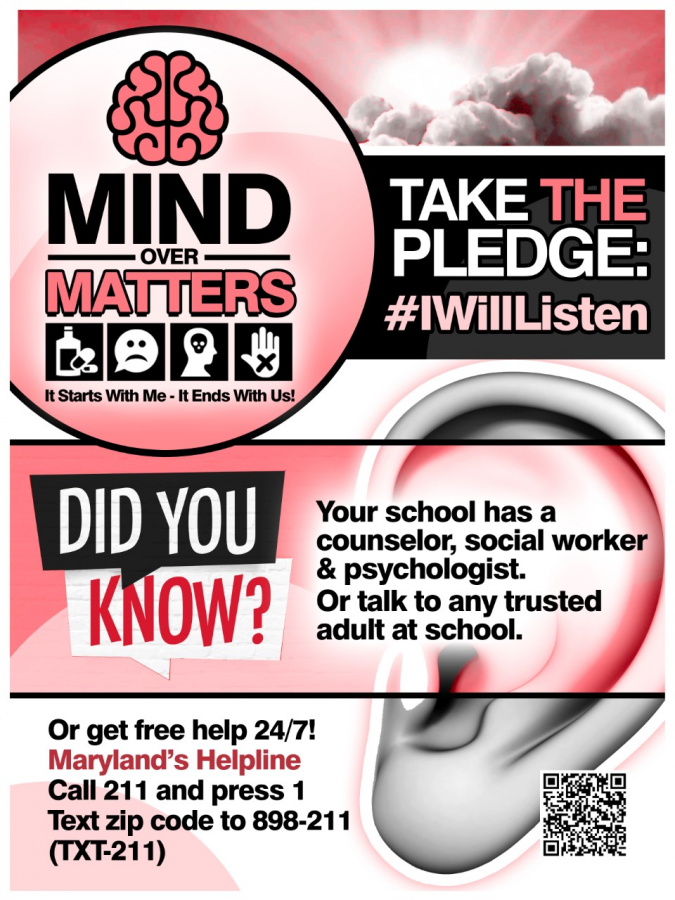Recognizing World Suicide Prevention Day
September 10, 2021
Today, September 10 is World Suicide Prevention Day. Kenwood staff wore yellow today to raise awareness of this issue. The American Foundation for Suicide Prevention states, “It’s only by learning more about what leads someone to suicide, the ways we can help to prevent it, and what resources are available – and not being afraid to ask when we’re worried about someone, or for help when we need it ourselves – that we can empower our communities to address this leading cause of death.”
BCPS’s Division of School Climate and Safety provides support for all social-emotional health issues with its year-round Mind over Matters campaign.
As students, teachers, and all people are emerging from their home from the isolation of the ongoing pandemic, the concern for mental health is greater than ever. The trend of young children and teens mental health and suicide was a concern before the pandemic. Last Spring, now senior IB student Bryn Lang, completed a suicide prevention CAS project with the Joshua York Legacy Foundation that she called Kindness Rocks to help raise awareness of suicide prevention here in the Kenwood community.
Many people don’t realize what others are going through. People need to talk about their problems more so that we can try to prevent things like suicide from happening. Most people that need help from their suicidal thoughts and depression don’t receive any treatment at all. The treatment that they deserve could save their life if there were measures put in place to identify those that need the treatment (Posner, 2018). When teenagers are depressed, they usually don’t feel like doing anything. They don’t want to get out of bed or interact with people. They usually just want to be alone and don’t feel like doing anything productive. They don’t have any motivation to do anything that they or teens in general normally would. This would explain why some teens grades go down when they are depressed because they don’t have the motivation to try in school (Bruemmer, 2018).
Some teens think that they are the only ones going through bad times and thinking about suicide but even celebrities that seem to have everything go through hard times and consider suicide. (Posner, 2018) If someone has a history of depression in their family then teenagers are more likely to be depressed. Doctors are trying to help treat teenage depression. They want to spread awareness in schools for teenagers. Teens have a lot going on with school, sports, work, and socializing. They are trying to spread awareness for teen depression and to show people that teen depression is real (Brummer, 2018) The rate of suicide for children age 10-14 was very high. The rate of dying from suicide was the same as dying in a traffic accident for those age groups (Klass, 2017).
It is very hard to diagnose depression in teenagers. The warning signs are similar to what teens usually do on a normal basis so it’s much harder to figure out teen depression than adult depression. The warning signs include oversleeping and mood swings (Bruemmer, 2018). Teenagers are good at hiding things and they often try to hide that they are depressed. Suicide for teenagers between the ages of 15-19 is the second most common cause of death! Some teenagers are depressed and don’t know how to cope with it. But with the help of professionals teens can overcome their depression before they get to the point of where they want to commit suicide. Children that don’t get help when they need it don’t know how to deal with it when they are older if they had never gotten treatment for their symptoms before. If children would get help when they are younger it would help them overcome their problems like depression in the future, so they know how to cope with it (Klass, 2017).
Ms Single saw a situation like this happen with a high school friend; he died by suicide in 2008, after having graduated in 2001. She says, “It’s really a teacher’s job to make students aware that they are a person to talk to if they’re struggling. I take mental health seriously and make sure all of my students know I’m here for them. I don’t want to lose a student like I lost my friend!”
No one knows what anyone else is going through and what anyone says to anyone at any given time could make a turn for that struggling person one way or the other which is why it’s always stressed to choose kindness.
Help is always available. Your Kenwood teachers, counselors, social worker, and administration are here to support and listen so please don’t hesitate to reach out. Student BCPS ID cards also have information to help lines as well. Be sure to check out the Maryland’s Public Awareness Campaign on Children’s Mental Health Awareness and Maintaining Mental Health during the Coronavirus for additional resources. Other resources if needed:
United Way: 211
Crisis text line: Text the word “HOME” to 741741 for free 24 hour support
Maryland Suicide and Crisis Hotline: 1.800.422.0009
Baltimore County DSS: 410.887.TIME
Baltimore County Crisis Response: 410.931.2214
The Trevor Project: 1.866.488.7386 or text START to 678678
Maryland Food Bank: 410.737.8282
Be sure to listen and watch out for one another.
Sources:
Bruemmer, Ren. “Expert Says Spotting Depression is Key to Stopping Teen Suicide.” Montreal Gazette, 26 May 2018. Web. Accessed 2 March 2020.
Klass, Perri. “Is a Teen Moody? Or Depressed?” New York Times, Feb 2017. Web. Accessed 2 March 2020.
Posner, Kelly. “Preventing Suicide.” USA Today (Online), 07 Feb 2018. Web. Accessed 2 March
